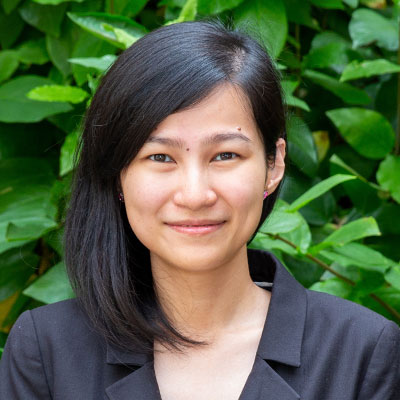UC San Diego Assistant Professor Recognized with Intel Rising Star Faculty Award for Trustworthy Machine Learning Research
HDSI’s Tsui-Wei (Lily) Weng is celebrated for her pioneering approach to responsible artificial intelligence and trustworthy machine learning
Story by:
Published Date
Article Content
At a time when the world continues to grow in its advancement in artificial intelligence (AI) and machine learning (ML), Assistant Professor Lily Weng at UC San Diego's Halıcıoğlu Data Science Institute (HDSI) within the School of Computing, Information and Data Sciences (SCIDS) has received the Intel® Rising Star Faculty Award (RSA). Weng is being celebrated for her pioneering research on trustworthy machine learning, which improves the robustness and interpretability of deep learning systems. Her research and approach underpin UC San Diego’s leadership on the world stage as a groundbreaker in data science, computing expertise and research now and in the future.

“Assistant Professor Weng demonstrates our commitment to building transdisciplinary academics and research at the new School of Computing, Information and Data Sciences,” said SCIDS Interim Dean Rajesh Gupta, who is also the founding director of HDSI. “The school creates new synergies through our faculty researchers, who are talented in emerging areas such as artificial intelligence and machine learning. We appreciate Intel’s recognition of Lily’s excellence.”
The annual Rising Star award spotlights early-career academic researchers around the world who are making groundbreaking advancements in technology research that demonstrate the potential to disrupt the industry. For this year’s RSA winners, Weng joins seven other leading academic researchers from Carnegie Mellon University, Purdue University, Stanford University, Tel Aviv University, Ohio State University, University of Pennsylvania and University of Southern California. They are being applauded for their research that found solutions to challenging problems in computer science, electrical engineering and computer engineering.
“I’m very honored to represent UCSD and be selected as top-8 faculty among 30 top universities worldwide,” said Weng. “I’d like to thank HDSI’s strong support, the Jacobs School of Engineering and UCSD’s support for nominating me for the award…I would also like to extend my wholehearted thanks to my incredible team, including the excellent students in my lab and my wonderful collaborators.”
Weng’s research pushes the boundaries of machine learning. Specifically, her research efforts have made substantial strides in improving the reliability and interpretability of deep neural networks (DNN). These efforts include developing fast, provable robustness certificates, creating scalable, robust learning solutions in the realm of Robust ML, as well as developing scalable automated interpretability tools to demystify inner workings of DNNs, and novel algorithms to train intrinsically interpretable DNNs in the field of Interpretable ML.
“Weng has pioneered the field of robust machine learning by establishing theoretical and algorithmic foundations to assess and improve the robustness of deep neural networks (DNNs),” said Intel in their announcement.
The work led by Weng and her students in their Trustworthy ML lab has also led the way in algorithms for automated interpretability in vision and language domains, which is innovative and uses a new approach. These algorithms aim to explain DNN functions using human-friendly concepts. They are also the first approach to build interpretable DNN scalable to ImageNet without needing curated concept labels. Furthermore, these advancements address crucial challenges in AI, such as reliability and transparency, which are critical for applications in computer vision, language processing, self-driving technology, healthcare and data security.
According to Weng, the societal impact of this work is profound. “By pioneering more interpretable and robust deep neural networks, we address the urgent need for transparent, equitable and reliable AI systems in fields such as healthcare, transportation and criminal justice,” said Weng. “For example, in healthcare, more interpretable models can improve diagnostic tools, helping healthcare professionals make more informed decisions and ultimately enhancing patient outcomes. In autonomous driving, greater robustness and interpretability in AI will lead to safer navigation systems, reducing accidents caused by AI errors. Furthermore, our efforts to identify and mitigate biases in AI models will promote fairness and equity in automated decision-making processes, ensuring that AI technologies benefit all members of society, regardless of race, gender or socioeconomic status.”
By addressing the key qualities essential for AI and deep learning systems, Weng’s work aims to develop the next generation of AI and deep learning systems, not only to grow their capabilities in safety and efficacy but also to make them more explainable, robust and reliable in tackling critical failures and biases.
In addition to being recognized for their research, Weng and the other award recipients of the RSA were chosen for their innovative teaching methods and to increase the participation of women and underrepresented minorities in science and engineering. The award celebrates Weng’s research achievements and highlights her role in advancing the field and inspiring future innovations, underscoring the impact of her research in the science and research community and beyond.
Learn more about research and education at UC San Diego in: Artificial Intelligence
Share This:
You May Also Like
Stay in the Know
Keep up with all the latest from UC San Diego. Subscribe to the newsletter today.



